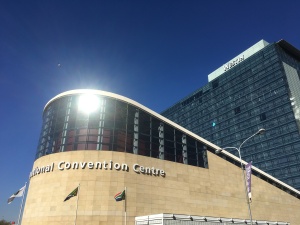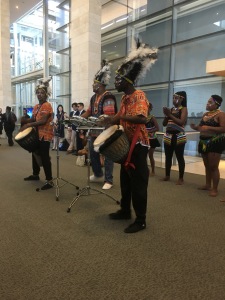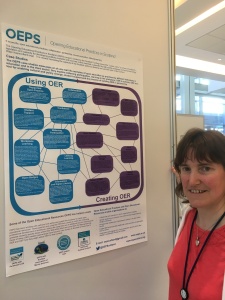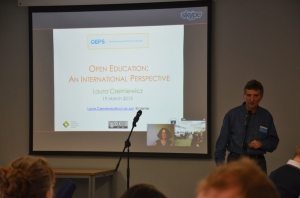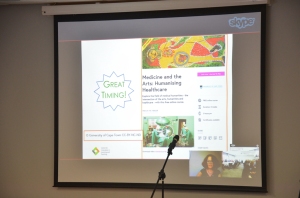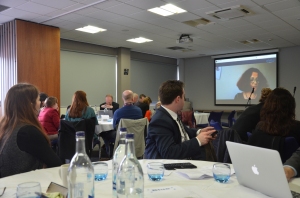Blog Archives
Reflections on OE Global and OER17 – part 1
by Anna Page (OEPS project)
Attending a Higher Education conference is always unique to each person. There is always a lot going on and with presentations scheduled in parallel sessions it is impossible to attend everything or talk to everyone. This year OEPS had a poster and a presentation at OE Global which for the first time was held in Cape Town and then a few weeks later had several presentations at OER17 in London. These are my reflections of attending both conferences.
I was fortunate enough to present a poster and presentation for OEPS at the 3 day OE Global conference, hosted by the University of Cape Town and chaired by Dr Glenda Cox, in the mother city of South Africa. The conference was held in the city based international conference centre, rather than on campus which sits on the lower slopes of Devil’s Peak. OE Global is organised by the Open Education Consortium and has always been in the ‘global north’ so it was good that the open education researchers in the ‘global south’ were given the opportunity to host it and challenge ‘global north’ perspectives about open educational resources (OER) and open educational practice. I had not attended OE Global before so it was an enormous privilege to travel such a great distance to present on behalf of OEPS in the city of my birth. Everyone I spoke with at the conference was very engaged in open education and how it might be used to improve the educational opportunities of a wider group of learners.
There was significant representation at OE Global by two overlapping groups – the ROER4D project, convened by UCT and the GO-GN researchers, convened by the OERHub based at The Open University. I attended several presentations by people from these groups, including a discussion about making use of MOOCs at UCT and another about understanding lecturer’s adoption of OER at three South African universities, postgraduate students as OER capacitators and exploring open educational practices of first year students at a SA university. I was interested in collaborative practices, so attended a presentation on teacher collaboration and practice (by Melissa King of BRIDGE, an NGO) which also explored the thorny question of measuring impact of OERs and one about teacher professional learning communities in India (this was a ROER4D sub project).
I was fascinated by the experience of an OER creation novice, Professor Jasmine Roberts from the USA, who discussed the impact of authoring OER on student engagement, learning and retention when she authored an open textbook for her students because the existing textbooks didn’t cover what they needed for their class. Early in her presentation she identified key reasons why more teachers are not using or creating OER: This is the same issue that Josie Fraser and others discussed at the OEPS forum 4 last year and is a challenge common to both ‘global north’ and ‘global south’ educators. Some of us in the session were able to point Jasmine to online resources which offer such advice and support, such as OEPS Becoming an open educator and How to make an open online course OERs on OpenLearn Create. However it was also clear from her experience that supportive open educational practice networks to help with answering specific questions about OER creation can help give OER creation novices the confidence to make a good start or to avoid some of the pitfalls along the way. It was encouraging to learn that the open textbook she offered her learners for free was well received, proved accessible to the learners and had a positive impact on their learning and enjoyment of the class.
The issues about making the work of researchers in the global south more visible and discoverable was explored by a presentation about the ROER4D curation and dissemination strategy. This strategy aims to make content open by default when it is legally and ethically possible to do so, especially if this increases its value to learning. I liked the fact that in the reasons why it was necessary to have such a strategy, all the arguments for good academic practice were cited as also good open educational practice. This was approached in a way to make it attractive to an academic to implement.
The poster sessions were in the coffee breaks and I was able to discuss the poster with several people as well as hand out OEPS leaflets, stickers and OpenLearn pens!
My presentation was on the last day in the final session before the closing plenary. It was encouraging to have an interested audience and some good questions about what OEPS has been doing with opening up practice on participatory course production. Beck Pitt, OEPS Researcher, live broadcast the presentation via Twitter Periscope.
After the closing plenary panel it was time for goodbyes as everyone dispersed back around the globe after taking in some of the sights of Cape Town.
Part 2 covers OER17 in London and my reflections on comparing the themes of the two conferences.
#oeglobal Anna page open courses https://t.co/ANn10BK5ZK
— Beck Pitt (@BeckPitt) March 10, 2017
Image credits: Cape Town Convention Centre, OE Global Gala Dinner, View of Table Mountain and Lions Head and Anna by the OEPS Poster by Beck Pitt and licensed CC BY 2.0.
#OEPSforum2 – Keynote by Laura Czerniewicz
The highlight of #oepsforum2 on Thursday 19th March 2015 was the presentation by Laura Czerniewicz on “An international perspective on opening educational practices“. Laura is the founder and Director of Centre for Innovation in Learning and Teaching (CILT) at the University of Cape Town and has worked in the field of educational technology at the University of Cape Town for over a decade. Laura’s slides can be found at http://www.slideshare.net/laura_Cz/oep-scotland-19-march
After Laura had made her presentation there were lively discussions at each table. We are pulling together some of the notes from the discussions and aim to publish them shortly – if you were in one of the groups and would like to add a personal reflection please email oepscotland@gmail.com with your comments or the link to your storify, comment on this blog post or use #OEPSforum2 on twitter.
The groups identified specific questions for Laura, which we sent to her during the session:
- Can you explain the perceived relationship between piracy and open educational practice?
- Is there government and strong institutional policies around open educational practice in South Africa?
- Recognising open education for a university – do universities recognise OER in their accreditation – are they looking at this in SA?
- OER would be useful if it filled a gap – give us a flavour of that conversation and who was involved?
- Contested landscape – your South African view – is this different from our view in the Global North?
- What is in it for the academics – they are focused on research and grants?
- How can we get people to feel participation is relevant – recognition as accreditation?
- Could you say more about policy context / enablers / drivers in South Africa context?
- How did you get senior management buy-in at UCT?
Laura rejoined us (via Skype) with her responses to some of these questions. If you have notes on Laura’s replies and/or personal reflections on her responses it would be great if you could share them.
If you are on twitter you can see some of the responses to Laura at #oepsforum2
